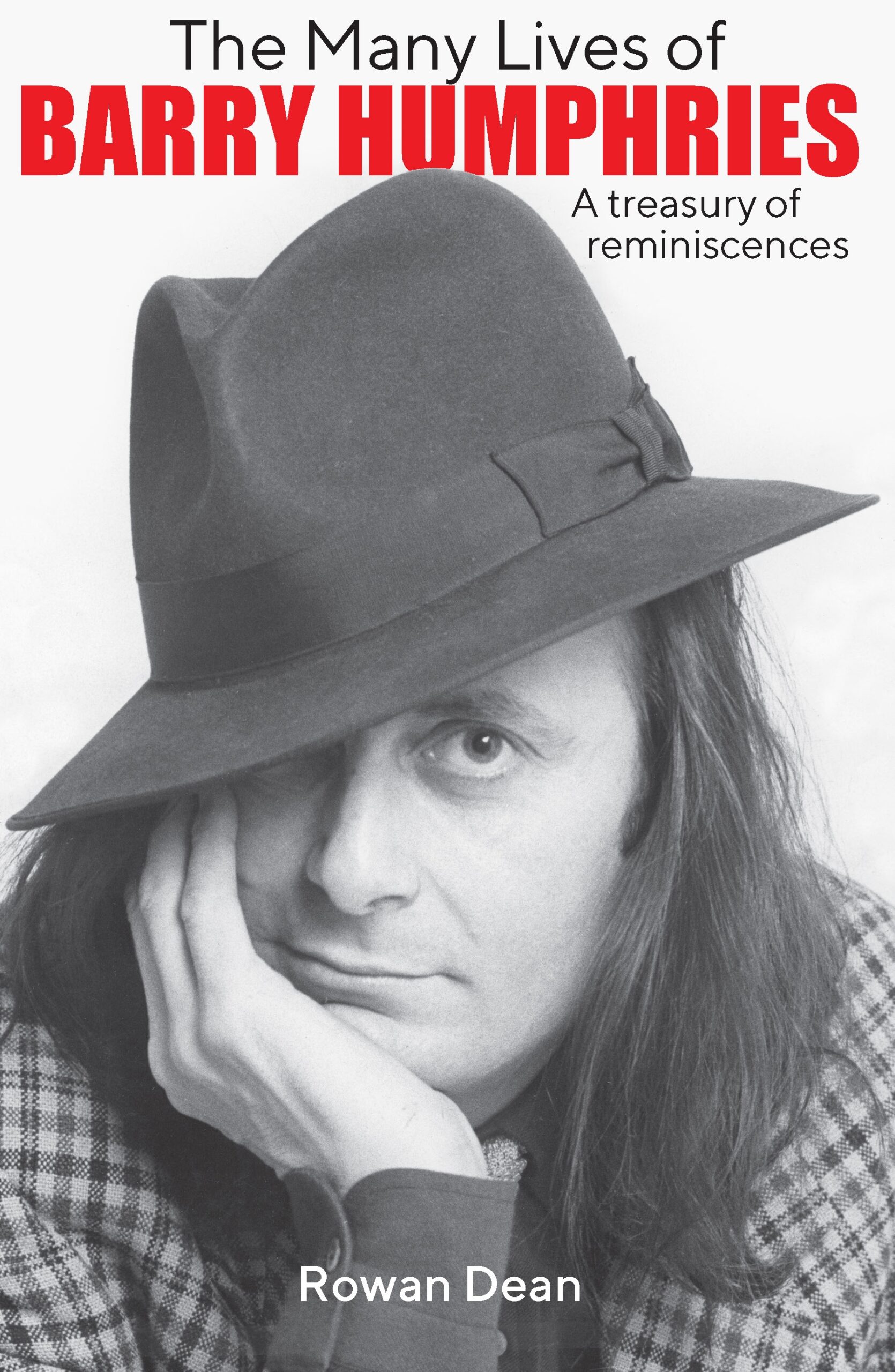EXTRACT: The Many Lives of Barry Humphries
THE DOGGEREL
There is an ear-splitting roar of blades and engines and an incredible rush of air as the helicopter gently settles down on the hospital roof. “Perches precariously” might be a better description, thinks the nurse to herself. Whose lunatic idea was this anyway? she ponders nervously, not for the first time. The engines wind down to a steady drumbeat, but the co-pilot is beckoning furiously. She instinctively ducks down as she pushes the famous comedian in his wheelchair towards the open door, convinced that if she stands upright she’ll meet the fate of Marie Antionette, or the helicopter equivalent of it.
After a few anxious moments nurse and patient are safely strapped in tight and the chopper climbs back into the clear blue Sydney skies. Barry Humphries is grinning mischievously, with that familiar twinkle in his eye. His lips are moving but she can’t catch his words above the din. She grins to herself. As always, he’ll have thought of some clever play on words with an appropriately unsubtle reference to imagined flirtatious activities. What on earth would HR say if they ever heard the bawdy banter and wicked double-entendres, make that triple-entendres, between the hospital staff and this Very Important Patient at any and all hours of the day or night?
She hadn’t seen Barry this excited in weeks. He’d been talking about this day, writing notes about this day, rehearsing this day, for at least the last two months.
The Opera House and the Harbour Bridge catch her eye – how could they not? – magnificently framed by diamantine waters, as the skyscrapers whizz past, so close she wants to reach out and touch them. Barry is pointing to a building down below, presumably the apartment he so regretted having sold, the one he had told her about several times now with its spectacular nighttime views of passing boats and ferries.
It’s far too noisy in the chopper to chat, so the two of them preoccupy themselves spotting and pointing to familiar landmarks below. In no time at all the city sprawl gives way to the corrugated iron inner-city sprawl which gives way to the red roofs of the western suburbs which give way to the rolling grassy hills of Camden and before you can say “hang onto you gladis, possums” they are touching down in a vineyard just outside Bowral. From there it is only a short drive to the autumnal splendour of Hopewood House. As they sweep in through the gates and up to the front door, Barry points to a magnificent bronze or metal sculpture of a colonial explorer on a horse, laden with all sorts of bric-a-brac. “Tim sculpted that,” says Barry. Then there’s that twinkle in the eye again. “Sculpture is one of his little hobbies. That’s when he’s not trying his hand at painting, of course.”
Unfortunately, the above is fiction. But it very nearly wasn’t. Elaborate plans for Barry Humphries to attend the Spectator Australia Writers Long Lunch had been under way for months. Plan A was a hire car to pick Barry Humphries up from St. Vincent’s Hospital, where he was convalescing, for the ninety-minute drive down to Bowral. Plan B – possibly the more extreme of the available options – involved a helicopter ride from the roof of St. Vinnies, there and back.
Attending the long lunch at the home of one of Australia’s most famous artists, Tim Storrier, had been on Barry Humphries’ mind for much of the last three months of his life. As the editor of the magazine, I had invited him back in January to attend the event on Friday April 14 as our guest of honour. Or rather, as one of several guests of honour. Unbeknown to me at the time, Barry had not long beforehand been admitted to St Vincent’s Hospital for what began as a hip injury but tragically ended up as a fatal diagnosis of cancer. Nonetheless, Barry told several of his closest friends that he was determined to be out of hospital regardless of his health situation by mid-April in time to attend “the Speccie lunch”. It had become a fixation. An obsession. A new stage to conquer, a new audience to mesmerise. And so, during March and April of 2023, during the last few weeks of his life, John Barry Humphries, the greatest creative talent to ever emerge from the antipodes, turned his mind to what he should say and how he should say it, selecting, unsurprisingly, one of his favourite art forms, a form of verse which he excelled in as a satirist and raconteur, yet which he self-deprecatingly always dismissed as “doggerel”.
“Doggerel” is an old English word – probably derived from “dog” – that describes rhyming couplets or verse such as children’s nursery rhymes, limericks or other forms of less sophisticated poetry which, to quote Barry, “are in flagrant violation of the tenets of good taste and the laws of versification.”

